Belgium may be small, but it has a big GDP of $599.11 billion. This shows it does really well economically within the European Union and Eurozone. The country’s position makes it very important for business. It’s known for sending out cars, vaccines, diamonds, drugs, and chemicals.
The way people do business in Belgium is quite special. They are polite, fast, practical, and can speak many languages. This makes doing business there smoother. Belgium is like a door to European markets. Companies that get how to work with these cultural differences often find success.
Key Takeaways
- Belgium boasts a $599.11 billion GDP, reflecting robust economic performance.
- The country is a major exporter of automobiles, vaccines, diamonds, pharmaceuticals, and chemicals.
- Polite, efficient, pragmatic, and multilingual business culture aids commercial interactions.
- Strategic location makes Belgium a crucial hub for European trade.
- Navigating cultural differences in Belgium enhances business success.
Overview of Belgium’s Business Landscape
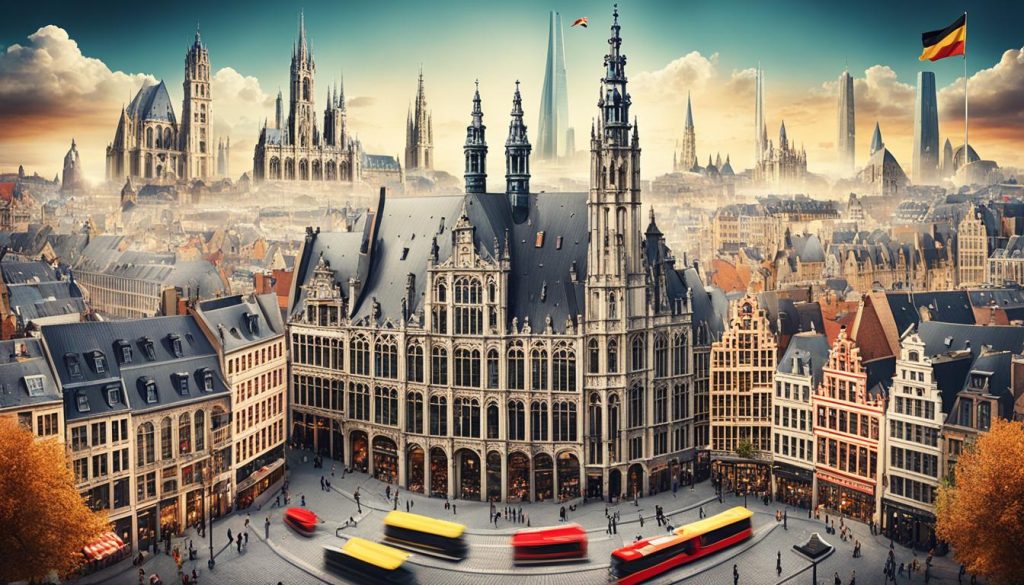
Its stable economy and supportive politics make it perfect for new businesses. This environment encourages innovation and start-ups, making Belgium a top choice for entrepreneurs.
The country offers low tax rates and helpful tax deals, boosting its business appeal. It also has a well-educated workforce that is skilled and talented. This means businesses have access to top-notch employees, crucial for success.
Belgium is also focused on helping new companies and tech advancements. These efforts help both new and established firms. With its good policies, strategic spot, and strong workforce, Belgium is a prime location for growing your business.
Key Economic Indicators: GDP, Unemployment, and Inflation
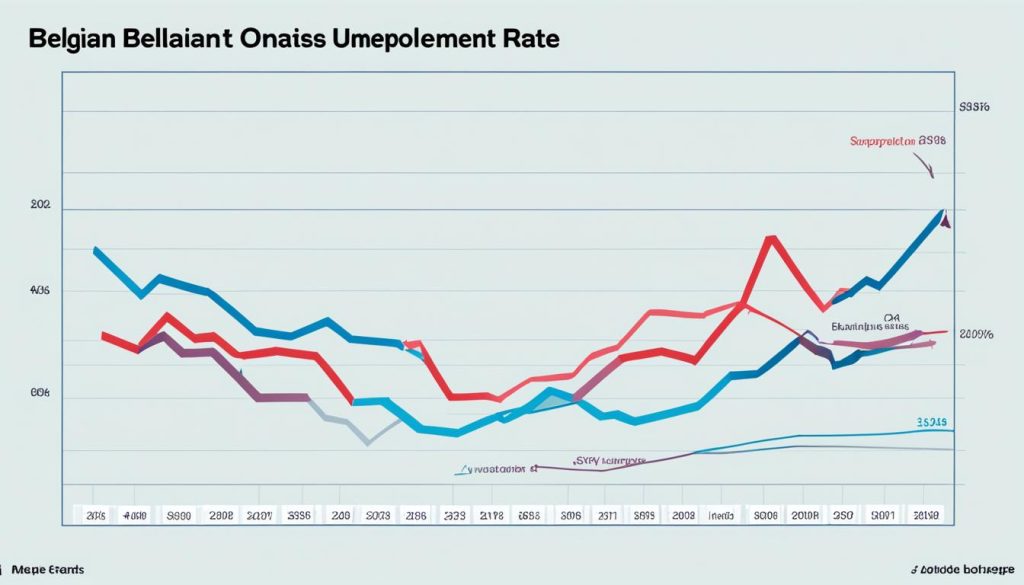
Belgium’s economic standing is shown through indicators like GDP, unemployment, and inflation. These factors help us see Belgium’s financial health and business opportunities.
Gross Domestic Product (GDP)
Belgium has a strong GDP of $599.11 billion, making it a key player globally. Despite having 11.6 million people, its GDP per person is $51,849. This shows its economic success and prosperity.
Unemployment Rate
The job scene in Belgium is positive, with unemployment at 6.4%. This low rate points to a solid job market. It highlights Belgium’s economic well-being and the jobs it offers.
Inflation Rate
Inflation in Belgium is at a manageable 3.2%. This keeps prices stable, helping the economy. It benefits both shoppers and businesses in Belgium.
Major Industries and Exports
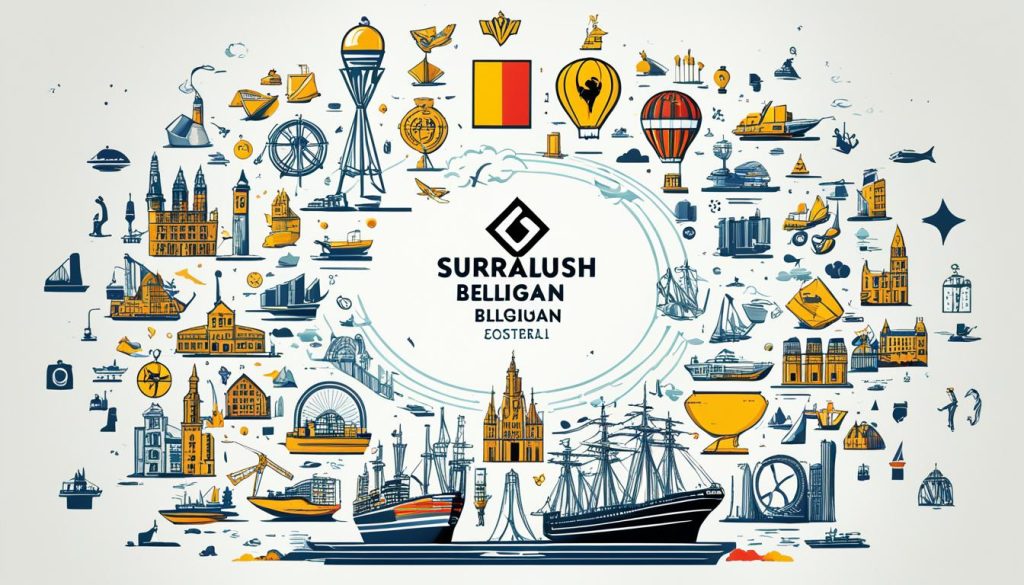
Belgium is known for its vast export economy, focused on automotive, pharmaceuticals, and diamonds. These sectors are key in boosting the nation’s economy. They also increase its export power.
Automotive Industry
The automotive sector is vital to Belgium’s exports, meeting high global demand. Factories owned by big names like Audi and Volvo produce many cars annually. Belgium’s location and high-tech production make it important in the global car market.
Pharmaceuticals and Chemicals
Belgium is a leader in pharmaceuticals, known for innovation and wide-reaching impact. It houses big firms like Janssen Pharmaceuticals. Strong research and intellectual property laws help it stay ahead globally.
Diamond Trade
Antwerp, Belgium, is crucial in the diamond world. About 80% of rough diamonds go through Antwerp. This boosts Belgium’s standing in jewelry and benefits its economy.
With these industries, Belgium keeps a varied and strong export strategy. It works closely with top partners like the UK and the US. This helps Belgium grow and stay engaged in the world’s economy.
Belgium’s Strategic Location in Europe
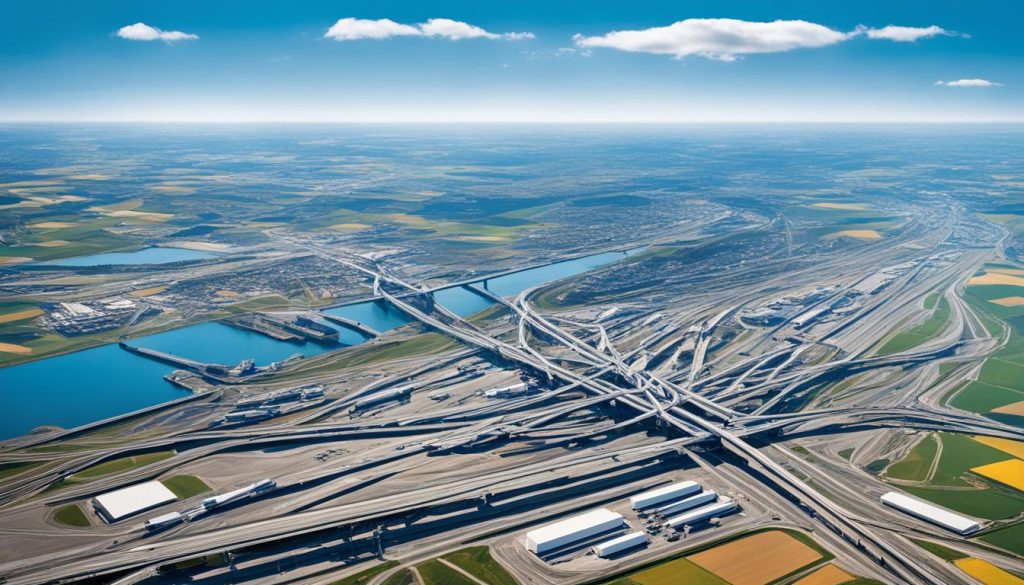
Belgium is in a prime spot in Europe, which is great for businesses wanting to tap into the big market. Its location acts as a door to the EU market, offering many chances for growth. Thanks to top-notch transport, Belgium is key for trade in Europe.
Belgium’s central location is unmatched, giving amazing access to major European markets. Firms expanding in Europe find Belgium’s roads, ports, and rails very helpful. This network makes shipping faster and cheaper, highlighting Belgium as a main entry to the EU.
Belgium not only has strong infrastructure but also excels in multimodal transport. It connects with global shipping, offers air freight, and has big inland waterways. These points make Belgium central in helping trade flow smoothly across Europe. It keeps attracting companies worldwide that need efficient market access.
Corporate Tax and VAT Rates
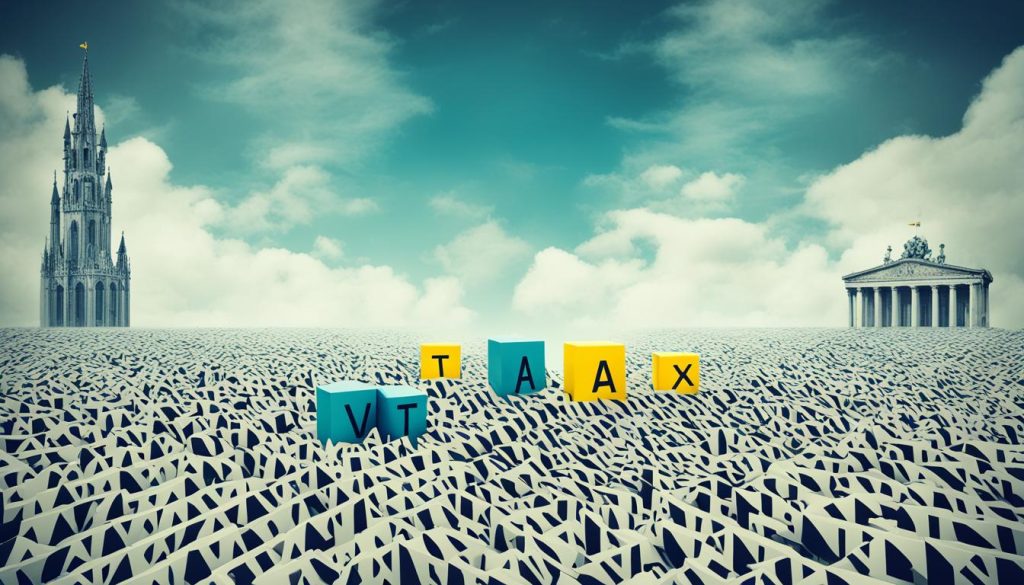
Belgium gives businesses a good edge with its tax policies. Companies pay a main tax rate of 25%, making them strong in the European scene. Small and medium-sized companies have a special deal with a 20% tax rate. This helps these emerging businesses grow and thrive.
Corporate Tax Rate
The corporate tax rate in Belgium is at 25%. This makes Belgium a great place for big international companies. For SMEs, there’s a lower tax rate of 20% if they earn under €100,000. It shows Belgium wants to help small businesses succeed and grow.
Value-Added Tax (VAT) Rate
Belgium has a VAT rate of 21%. This strikes a good balance for the government and businesses. The VAT system is made simple to help companies follow the rules easily. Also, there are lower VAT rates for important goods and services to help achieve economic and social goals.
Knowing Belgium’s tax rules helps companies grow and stay stable in the area. They can use these tax benefits to their advantage.
Business Language Diversity in Belgium
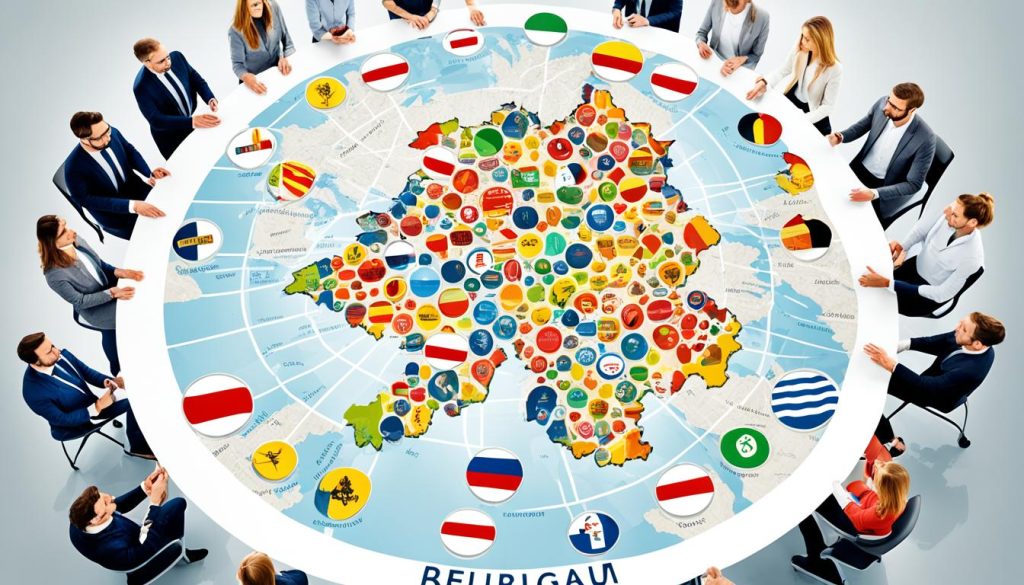
In Belgium’s business world, knowing different languages is key to success. Learning about the language variety helps a lot in making strong, lasting business connections.
Dutch Usage in Flanders
In Flanders, the north part of Belgium, about 60% of people speak Dutch. Businesses there should focus on Dutch to talk well with locals and clients. Even though many know several languages, using Dutch shows respect and builds trust.
French Usage in Wallonia
In Wallonia, the south, French is mainly spoken by about 30% of people. Firms should speak French fluently to do well and build good relationships. It’s also crucial to get French business culture.
Multilingualism in Brussels
Brussels, the capital, is truly multilingual, with Dutch, French, and English all widely used. Around 10% speak English, making it important for business. The city’s diverse languages show its global nature and central business role. Being flexible and respectful of language choices improves business dealings in Brussels.
Work-life Balance and Benefits

In Belgium, a good work-life balance is very important, with lots of benefits for worker’s health. Such benefits help employees enjoy both their jobs and personal life more. This leads to higher productivity and happiness.
Paid Vacation Policies
Belgium offers a generous amount of paid holiday for its workers. This means they get plenty of time to relax and have fun. Every worker gets at least four weeks of paid leave a year, showing the country’s effort to maintain a balanced life.
Work Timings and Flexibility
Belgium follows the EU’s rules for work hours, usually from 8:30 a.m. to 6:00 p.m. But, it also supports flexible hours, helping employees balance work with personal activities. Such flexibility leads to a happier and more productive work life.
Belgium’s Startup Ecosystem

Belgium’s startup scene is booming, full of potential and supported wonderfully. It stands out thanks to its excellent location and lively setting. Entrepreneurs find Belgium an ideal place to start and grow their businesses. Let’s look at what makes this ecosystem so inviting.
Support for Entrepreneurs
Belgium offers great backing for entrepreneurs, with a wealth of support systems. Groups like Startups.be and imec.istart provide guidance and tools for young companies. Moreover, co-working spaces in cities like Brussels and Antwerp offer spaces that are affordable. These places help people work together and share ideas.
Government Initiatives and Funding
The Belgian government is key in pushing the startup scene with various supports and funding. The Startup Visa and numerous financial aids encourage talented individuals to set up there. Funding programs like Innoviris and PMV give money and loans. They help startups grow and succeed.
Alongside government help, there’s a lot of private funding too. Venture capital firms and angels play a big part in funding. They offer the necessary money to startups with potential. This mix of support ensures Belgium’s entrepreneurship keeps blossoming.
Communication Styles in Belgian Business

Getting the hang of business chats in Belgium is key to doing well. Belgians value politeness and sticking to formal ways. They like their communication straightforward and polite. This is true for both writing emails and talking in person.
Email Etiquette
In Belgium, emails need to be detailed yet formal. It’s vital to be polite and make your point clear. Start with a formal “hello,” get the recipient’s name right, and end with a kind “goodbye.”
Being detailed and quick to reply is also part of the Belgian way. It shows you’re professional.
Face-to-Face Communication
Face-to-face talks are as important as emails. They help build trust and connection. Always begin with friendly chit-chat before business talk. This is common in Belgium.
To communicate well in Belgium, speak plainly but kindly. Being efficient yet respectful is the Belgian method. This balances getting things done with valuing the other person.
The Role of Hierarchy in Flemish and Walloon Companies
Belgium has unique company cultures in its Flemish and Walloon regions. These differences impact company hierarchy. Acknowledging these can boost business performance in these areas.
Flat Structures in Flanders
In Flanders, businesses usually have Flemish organisational structures. They have a flat hierarchy. This means open talks and working together in making decisions. It leads to a welcoming work setting. Everyone can share ideas and join management talks. This shows a forward-thinking work culture.
Hierarchical Structures in Wallonia
In contrast, Wallonian corporate culture values traditional hierarchies. Wallonia’s firms have a distinct chain of command and set communication ways. They hold respect for seniority and organised structures in high regard. This shows their deep cultural values of order and clarity at work.
Knowing about company hierarchy Belgium is key for success in both Flemish and Walloon regions. It helps companies adjust their strategies to meet local expectations and manners.
Conducting Business Meetings in Belgium
Understanding Belgian meeting etiquette is key to successful business interactions. It’s about knowing the local customs and protocols. This deep understanding ensures smooth meetings and collaborations.
Meeting Protocol
Punctuality is essential in Belgian business meetings. These meetings are formal and well-structured. Initially, there’s small talk to build rapport.
Then, a detailed agenda guides the discussion. This approach values efficiency and respects everyone’s time.
Decision-Making Process
In Belgium, decision-making is about teamwork and reaching a consensus. Everyone’s input is valued in this cooperative system. This ensures decisions are well-thought-out and widely supported.
It reflects Belgium’s cultural values of pragmatism and cooperation. This approach makes corporate decision-making effective within a structured meeting.
Business Attire and Dress Code
Wearing professional clothes is important in Belgium. The Belgian professional attire is all about classic style. It shows that people care about looking smart and respectable.
Men usually wear dark suits with ties. This gives them a sharp and formal appearance. For women, business suits or conservative dresses are common. These choices reflect a wish for formality and elegance.
The way people dress at work in Belgium is more than just about looking good. It shows a deep sense of professionalism. By following the corporate fashion standards, everyone shows they value their job. It also helps to make the workplace feel orderly and respectful.
Belgian Gift-Giving Policies
In Belgium, corporate gifts should be subtle and thoughtful, not too lavish. This shows a preference for simple, meaningful gestures. Luxurious presents are usually avoided, to keep things sincere and genuine.
In business, giving gifts isn’t a big part of the culture. Yet, when presents are given, they’re modest. They aim to show goodwill and appreciation, staying clear of excess.
Belgian professionals look for authenticity in gifts. They prefer presents that mean something or are practical, not just promotional. This fits with Belgium’s approach to business gift-giving, which values respect and mutual recognition over transactions.
It’s best to choose gifts with little to no branding. The goal is to build stronger relationships, not to advertise. By sticking to these guidelines, companies can make sure their gifts to Belgian partners are well-received.







